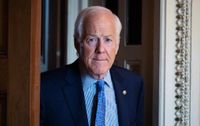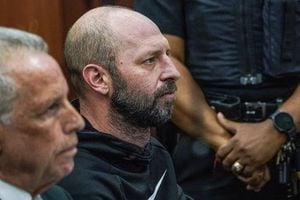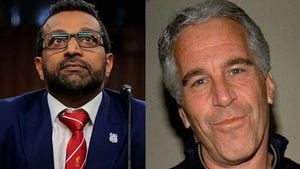Outside the Massachusetts State House, in the thick Boston summer heat, political drama unfolded that echoed far beyond the city’s historic brick walls. Utah House Minority Leader Angela Romero stood shoulder-to-shoulder with Democratic lawmakers from across the country, lending her support to a group of Texas Democrats who had just taken a dramatic step: fleeing their home state to prevent a vote on mid-decade redistricting efforts. The protest, staged during the National Conference of State Legislatures' 50th annual summit from August 6 to 8, 2025, was more than a symbolic gesture—it was a flashpoint in a national debate over voting rights, political power, and the very machinery of American democracy.
The Texas Democrats’ move was bold, but not unprecedented. As the Dallas Observer pointed out in an analysis published on August 9, 2025, the tactic of breaking quorum by leaving the state had deep roots in Texas political history. In 2003, Democratic legislators, dubbed the "Killer Ds" and "The Texas 11," decamped to Oklahoma to protest a similar Republican-led redistricting push. The outcome then? A temporary delay, but not a derailment—Republicans ultimately got their way, redrawing the maps to their advantage. Fast forward to 2025, and the stakes feel even higher, with partisanship more entrenched and the levers of power more tightly gripped.
Romero, reflecting on her own state’s fraught experience with redistricting, saw clear parallels. "We look at our home state, where a few years back also approved maps, and those were not the maps that were presented to us by the independent commission, and that congressional map we passed is in the court," she told KUTV. Utah voters had approved an independent redistricting commission in 2018, only to see lawmakers reduce its authority, leading to a legal battle over the 2021 congressional map still unresolved as of August 2025. "Any day now we will find out what will happen," Romero said, her voice tinged with both hope and frustration.
For Romero, the issue transcended party lines. "For me, this isn’t about being a Democrat or Republican but about fair process," she insisted. Her words resonated with a country weary of political theater and deeply distrustful of institutions, especially as the U.S. Census Bureau recently admitted to significant miscounts in the 2020 census—Utah was overcounted by 2.59%, Texas undercounted by 1.92%. "People have lost confidence in us as elected officials, and it is our job to bring that confidence back," Romero added, emphasizing the need for transparent, bipartisan solutions.
Yet, the protest in Boston wasn’t just about Utah or even Texas. It was about the future of American democracy. Texas Republicans, led by Governor Greg Abbott and Attorney General Ken Paxton, were determined to push through new congressional maps that would likely solidify their party’s dominance ahead of the 2026 midterm elections. According to the Dallas Observer, President Donald Trump’s involvement had "created an overwhelming political situation for dissident Democrats," with redistricting added to the special session agenda at his urging. The Republican grip on Texas politics, once a novelty in 2003, was now deeply entrenched, and the path for Democratic resistance looked narrower than ever.
Republican leaders weren’t content to wait for the Democrats’ return. On August 7, 2025, Senator John Cornyn announced that FBI Director Kash Patel had granted his request for federal assistance to locate the Texas House Democrats, who had traveled to Chicago to meet with state lawmakers there. Cornyn praised President Trump and Director Patel for "supporting and swiftly acting on my call for the federal government to hold these supposed lawmakers accountable for fleeing Texas," as reported by HuffPost. "We cannot allow these rogue legislators to avoid their constitutional responsibilities," he declared in a press release.
The move sparked immediate backlash. Rep. Jamie Raskin, the top Democrat on the House Judiciary Committee, urged FBI agents to refuse participation in what he called "an act of political harassment and persecution." Raskin argued, "The FBI is not a national secret police force operating at the beck and call of President Trump. It has no legal authority to track down state legislators who are breaking no federal laws just for standing up to a Republican scheme to purge Democrats from Congress and rig our elections." The FBI itself declined to comment on the request, leaving the public in the dark about whether federal agents would be dispatched to hunt down state lawmakers.
The political temperature continued to rise. Democratic Senate candidate Colin Allred accused Cornyn of "weaponizing federal law enforcement to silence dissent, while staying completely silent on actual threats to public safety." Allred warned, "That’s not law and order — it’s a dangerous abuse of power. And we won’t let it stand." Meanwhile, the Trump administration moved to purge FBI officials involved in the investigation of the January 6, 2021, insurrection, a move Senator Mark Warner called "nothing short of alarming." Warner added, "The American people deserve to know that federal law enforcement is free to follow the evidence without fear of retribution from the White House or its lackeys."
The historical context only sharpened the sense of déjà vu. In 2003, the Democrats’ walkout made national headlines but ultimately failed to stop the redistricting train. As SMU political science professor Ben Voth explained to the Dallas Observer, "The two walkouts of 2003 and 2021 were not successful and there is more political momentum on the side of the Republicans than there was in 2003 and 2021. There is an exceptional political alignment for the Republicans in both legislative chambers at the federal and state levels." Even demographic shifts that once favored Democrats now seemed to complicate their strategy. "The decline of Hispanic affiliation with Democrats, especially in the Rio Grande, complicates the fundamental premise of racially motivated redistricting. In fact, the Republicans have some basis for thinking that new districts provide a more accurate representation of Hispanic and other minority support for the Republican Party. All minority support for the Republican Party has grown in Texas since 2020," Voth observed.
Romero’s message to voters was clear and urgent. "It’s important to see who your elected official is. Reach out, let them know what your concerns are—whether it is gerrymandering or housing, whether it is the cost of living—we are here to listen and represent you." As the legal and political battles rage on, she and other lawmakers continue to hold out hope for compromise and a return to what she called "traditional roots and what matters to people." But, as history has shown, breaking quorum may delay the inevitable, not prevent it. For now, the fight over redistricting remains a vivid reminder of the high stakes and deep divides shaping American politics in 2025.





